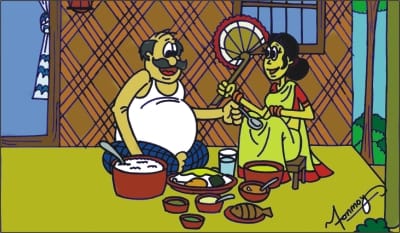Contemplating “Bangaliaana”

This was a sea of white and red. Aromatic leis swaying to soft melody. From a distance a jubilant, roaring crowd -- red and white mingling with bursts of colour, jeans and sunglasses -- rocking to the beat of the dhol. Further out, swarms of people oblivious to the beat, eyeing the stands of pitha and panta bhat hungrily. And still further away -- far from the security stands and a bit difficult to spot -- small groups of people huddled together, fists shaking, oblivious to all else, and clearly venting their angst over something or the other.
The scene is so typical of Pahela Baishakh, homogeneity melting into variety...I heard a friend touting it as “Bangaliaana”. What is this Bangaliaana?
One of the earliest definitions was quite simple -- “Poetry and politics” -- that's what defines Bengalis. In a way that's not entirely untrue. This region had produced creative geniuses and visionaries. Nazrul's fiery words came to inspire rebellion as much as Tagore's renunciation of the Knighthood. Though brutally tortured in jail, Mukunda Das did not refrain from generating his anti-Raj compositions. During the Swadeshi Movement in 1905, Dwijendralal Roy started composing patriotic songs rather than the witty ones he became known for.
Songs aired on the Swadhin Bangla Betar Kendra during the Liberation War and on Bangladesh Betar in the post-war years, saw an inspiring level of patriotism and fine demonstrations of poetry. Some point out that in the last two decades the leading politicians of our country -- who are adept at mobilising the masses with their powerful speeches -- had demonstrated their artistic (poetry and singing) skills on TV. This year the audience surely missed those "heartfelt" performances.
Then again some old sayings such as, “Baro mashey tero parbon”, “Machhey bhatey Bangalee” or “Dudhey bhatey Bangalee” highlight the festivity and food in the typical Bengali lifestyle. Apparently there's a saying for each type of food -- from main course to desserts! Case in point: Jogindranath Sarkar's popular rhyme --
Daad khani chal mushurer daal,
Duti paka bel,
Shorishar tel,
Chini pata doi, dim bhora koi...
And who can argue this gastronomic obsession of the Bengalis? As a national daily ran the news that in Dhaka city alone 40,000 kgs of sweets and 20,000 kgs of doi (sweet yoghurt) were sold on Pahela Baishakh this year.
Take any narrow Old Dhaka gali (alley), any time of the day, and a foodie will find scrumptious alu puri, daal puri, paratha, gilapi, beguni and bora sizzling in the oil, next to a plethora of spicy curries, accompanied by mounds of desserts ranging from Rasgolla, Lalmohon, Sandesh, Mohonbhog and so much more.
Bengali hospitality? Second to none! How else can one explain the British staying back for nearly two centuries? Jokes aside, the devotion Bengalis have towards entertaining guests is legendary. The smallest gathering turns into a feast. Treating guests to just a cup of tea is unheard of (nothing but a full-scale banquet will do). Of course sometimes we take advantage of it too, visiting good hosts without warnings (during dinner), squeezing into wedding invitation lists...
Romanticism? For sure! Who came up with tear jerking love stories like Devdas and Parineeta? On the flip side of romanticism comes absentmindedness, and unbridled emotion -- emotion that often leads to tiffs over triviality, or obhiman for eternity!
Laid back? Perhaps...who doesn't enjoy the siesta, or the record number of national holidays? Tagore's words have an alarming ring of truth in this regard --
Toilo dhala snighdho tonu
Nidra roshey bhora
Mathaye khato bohorey boro
Bangalee shontan
Kobiguru simultaneously reproaches –
Shath koti shontanerey hey
Bongo jononi,
Rekhechho Bangalee korey,
manush koroni...
Easy going, perhaps. Pushovers? Never! As history is the witness, no nation on earth has sacrificed lives to secure the right to speak its own language. Very few nations have confronted and survived repeated adversities in the forms of war and natural calamities.
So what is Bangaliaana? A combination of all of the above and more. Who knows? But it feels great to be part of it -- a vibrant culture that embraces one and all.

 For all latest news, follow The Daily Star's Google News channel.
For all latest news, follow The Daily Star's Google News channel. 




Comments